Welcome to Ceramic Review
Ceramic Review is the magazine for contemporary and historical ceramics, ceramic art and pottery.
Ceramic Review Issue 334
July/August 2025
Ceramic Review is the magazine for contemporary and historical ceramics, ceramic art and pottery.
July/August 2025
Sara Flynn makes porcelain sculptural vessels with refined surfaces. She speaks to Annie Le Santo about honouring authenticity within her practice
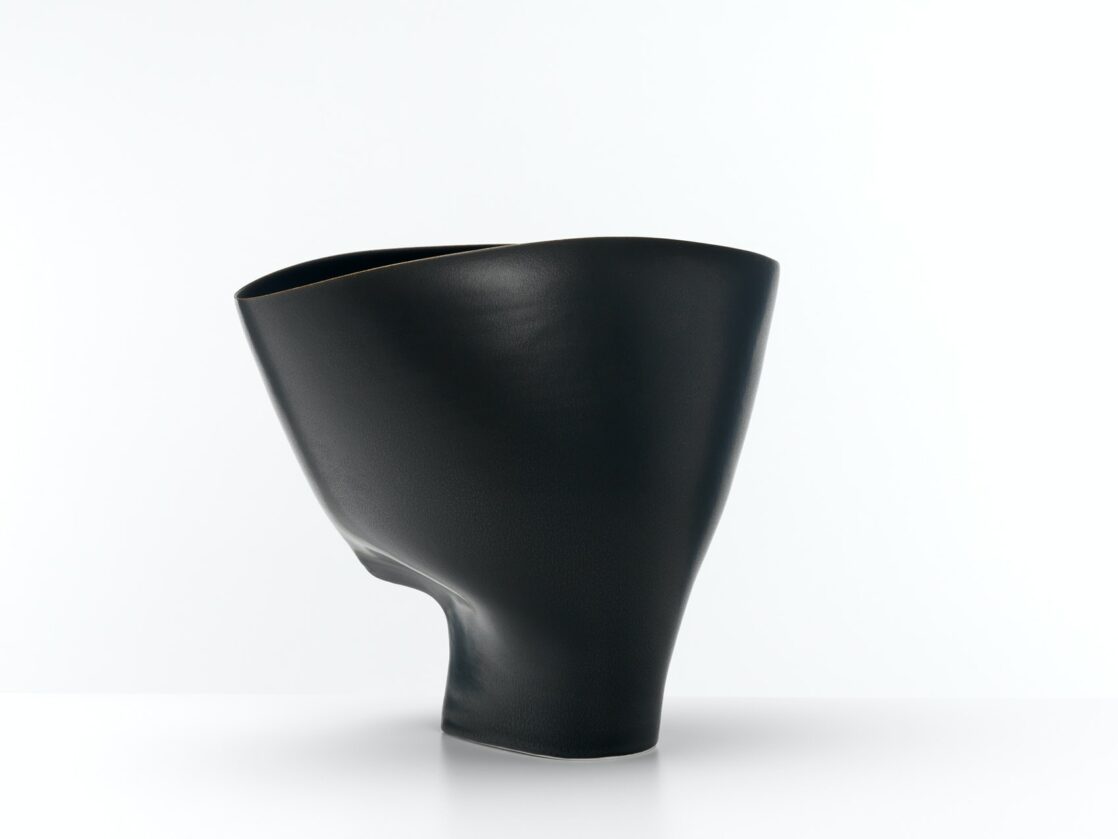
'Flection Vessel', 2020
Sara Flynn’s sculptural vessels are calm and considered. With sleek smooth surfaces, they emit an elegance that feels natural, easy even. However, as an artist, balancing between making what you love and making a living isn’t always as effortless. Chasing the sales could compromise your creative vision. But without stability, you may not be able to make anything at all. When speaking of her creative journey, Flynn is honest and realistic. Honouring authenticity in her work while being able to support herself has taken tough decisions, trial and error, alongside passion and dedication.
Born in Cork, Ireland, Flynn describes her early life in the countryside during the pre-internet age as ‘magical’. Her mother was a painter, but Flynn credits her ‘all-round creativity’ as the ultimate influence. ‘We didn’t have much money, but my mum grew our own fruit and vegetables, and would make and mend all sorts of things around the house,’ she says. ‘My father was a business director in the 1970s. I sometimes think the skills I learnt from him are underestimated, such as keeping to a schedule in the studio and the discipline of being self-employed.’
At school, Flynn was more social than studious. Indecisive, she enrolled on an Art Foundation course at a local college. ‘I told everyone I wanted to be a painter, because that seemed like the obvious thing when I was 17,’ she admits. ‘But me trying to paint was like a square peg trying to fit into a round hole.’ An encounter with clay later in the course is where things slowly started to shift. ‘I adored it,’ she explains. Though while it was a turning point, it didn’t necessarily develop into a master plan to pursue ceramics.
FINDING FOCUS
Flynn received a diploma in Ceramics from Crawford College of Art and Design in Cork, but still remained anxious about what to do next. With little going on in Ireland for her at the time, she craved a big city experience and moved to London in 1994, where she began working at Harrods on a retail management course. ‘Before moving, I would look through issues of Time Out magazine and imagine all the exhibitions I could go to in my spare time. But the reality was that I was on a low wage and it was expensive to just get from A to B,’ she describes. ‘I stopped working with clay completely for three years. It started to feel unfeasible to live in London if I wanted to be creative.’
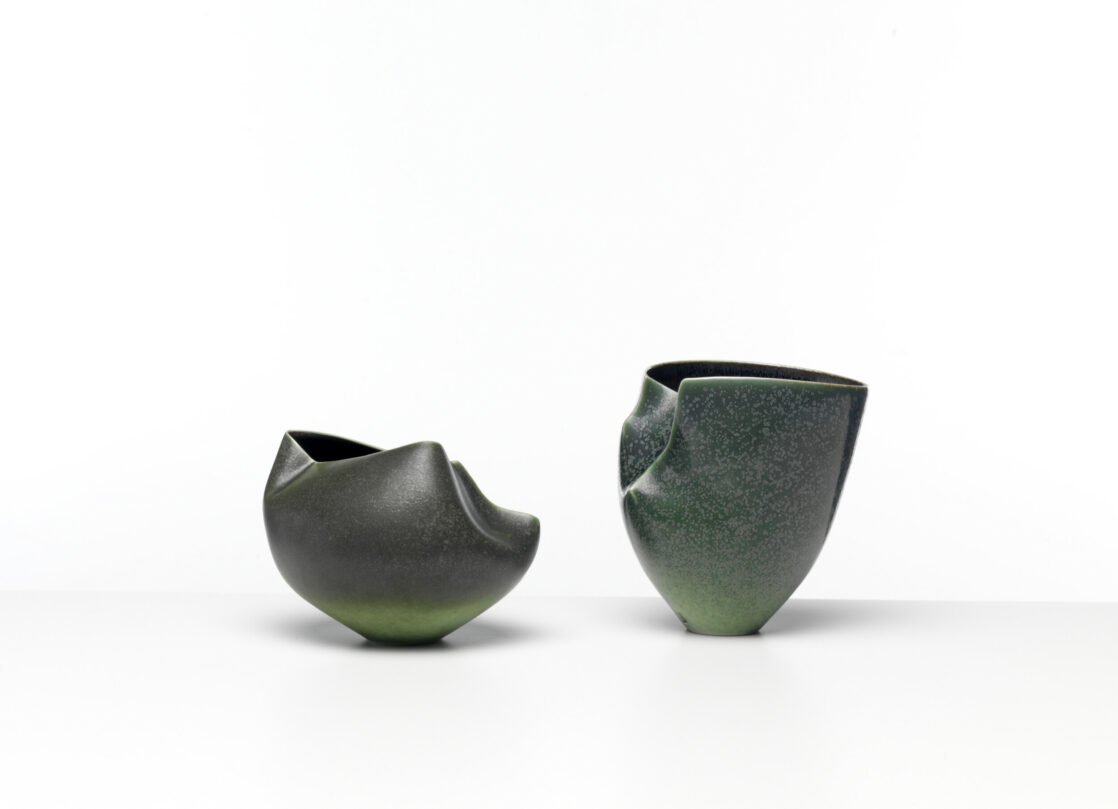
'Spine-Camber Vessels', 2021
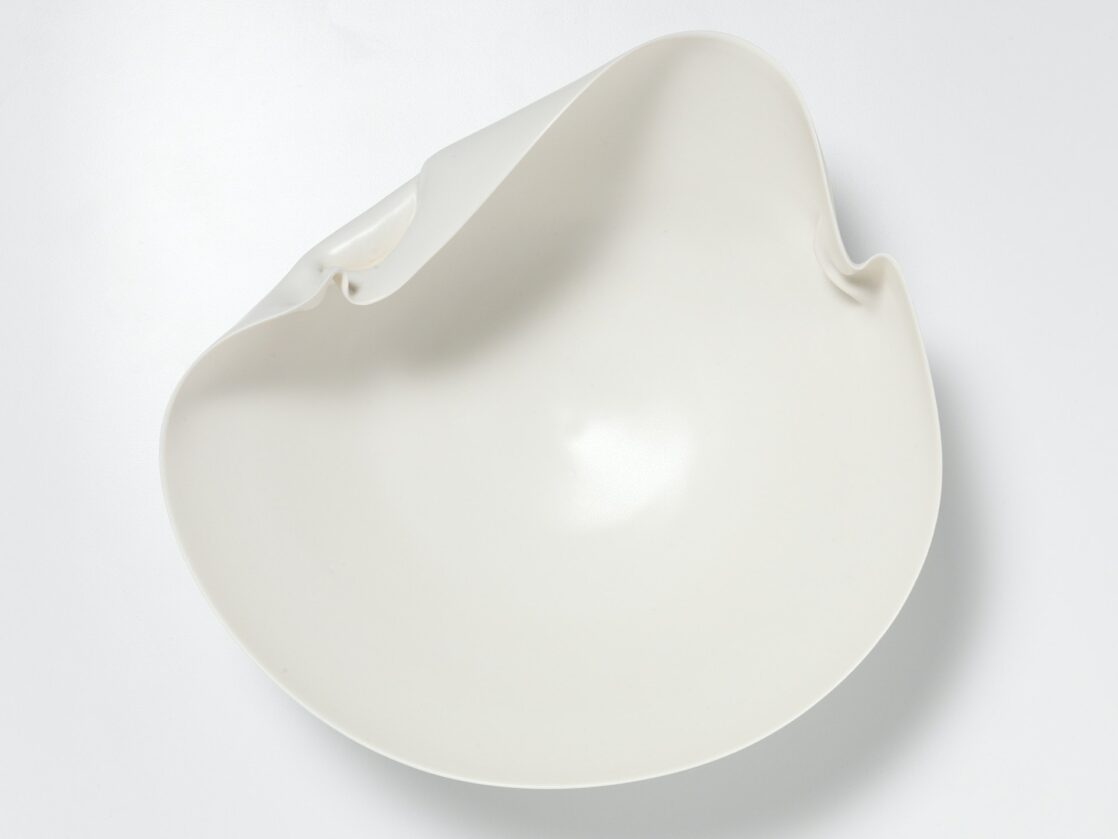
'Folded Vessel', 2022
She made the decision to return to Ireland in 1997 and convinced Crawford College to allow her onto a ceramics degree course despite having no portfolio. ‘Roisin Collins was my tutor. I told her that I had nothing to show, but if she let me on the course, I would work like a demon,’ Flynn explains. ‘That was the start of everything. Roisin was incredibly influential. I started working with porcelain and haven’t stopped since.’
As a graduate Flynn still had the sense of searching. Her degree had dissipated some of her aimlessness, but her end goal was not quite yet in sight. She started out by setting up a studio shop in her hometown of Kinsale in County Cork, putting to use her retail experience. In the view of the public, she created functional wares, which customers would readily purchase.
‘In hindsight, I see my pursuit of functional ceramics as insulting to those who are passionate about it. Looking at someone like Lisa Hammond who creates stunning pieces, would make me feel like a fraud,’ admits Flynn. ‘When functional ceramicists make a cup, it is going to be beautifully considered. If they are going to add a handle, it is going to be of perfect proportions. I didn’t think that way, and it began to hold me back. I felt dishonest.’
Demoralised, Flynn faced another crossroads. She wrote a pros-and-cons list of staying in her current set up or taking the risk to move away to pursue sculpture instead. The latter option felt significantly more endearing, and in 2005 she moved to Leap in West Cork, a rural location that was more financially forgiving. This was her opportunity to create new, different work without the immediate pressure to sell it. ‘Collectors of sculpture have a very discerning eye that can see whether something is truthful or not,’ she says. ‘I knew I had to start making work with absolute honesty.’
MAKING PROCESSES
All of Flynn’s vessels are made from porcelain. She makes her own glazes, something she speaks of with passion, which contributes to a large part of her practice. Her polished forms begin on the wheel and are then altered by hand: cutting, pulling, pinching, deconstructing and rebuilding. These processes suggest her to be a ceramicist, however Flynn chooses to describe herself as a sculptor.
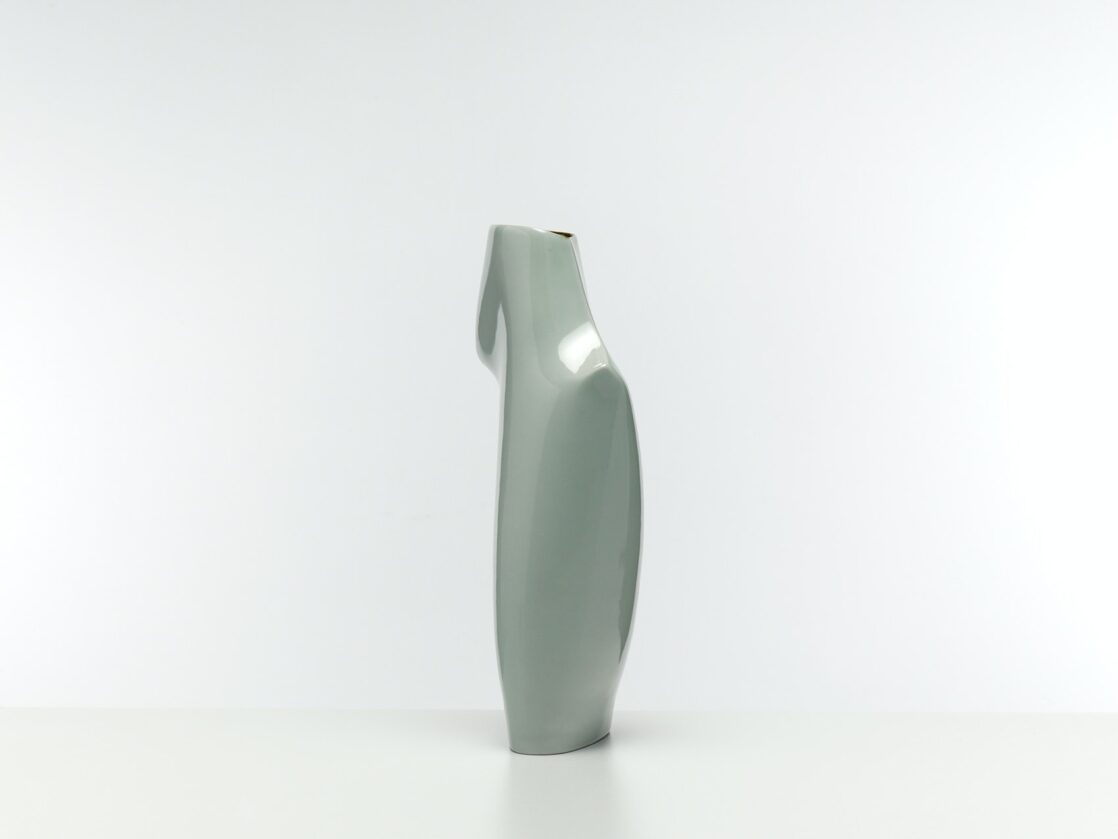
'Flection Vessel', 2020
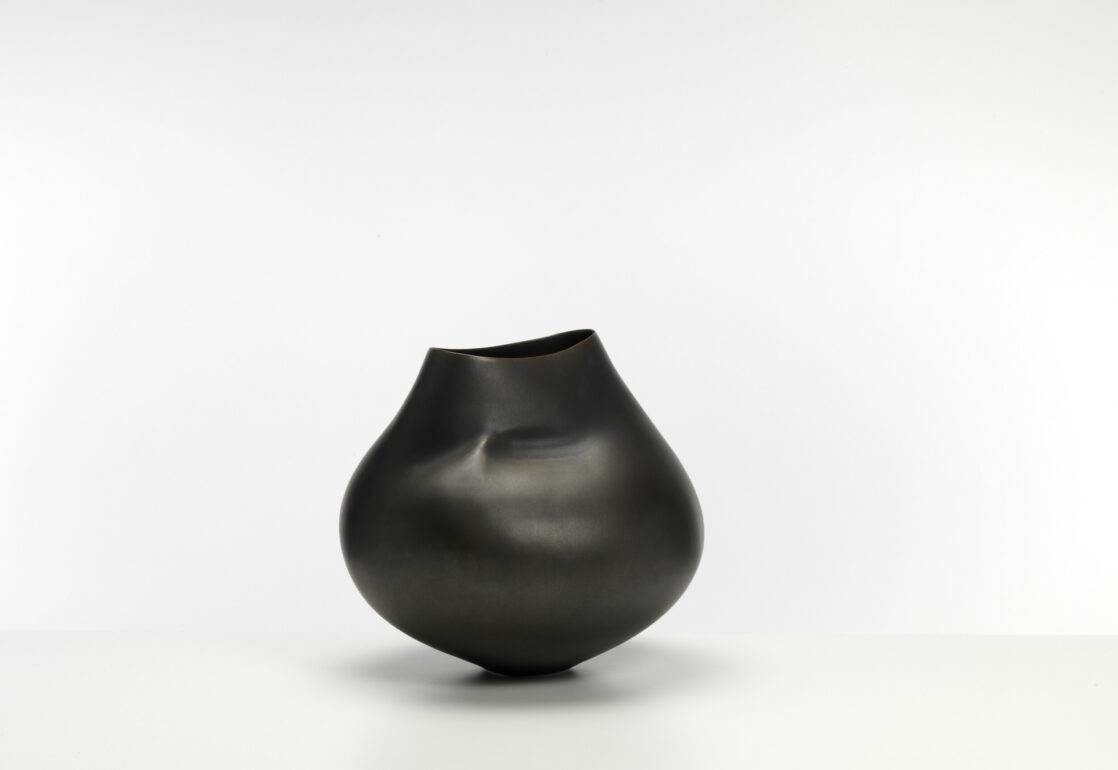
'Camber Vessel', 2021
‘In the ceramics world there is a unique focus on the word ceramic, but if someone was working with stone, you would probably describe them as a sculptor rather than a stone sculptor,’ she points out. ‘It has taken me a while to comfortably introduce myself as this too. Hans Coper is my hero and I would call him a sculptor. I don’t feel the need to add ceramic.’
That said, clay as a material is vital to Flynn. She does not wish to distance herself from it. ‘I think there are a few factors at play – the material, the form and the ceramic processes – and for me these can’t be separated,’ she explains. ‘Sometimes I find a type of glaze and think how I would like to present the way it breaks on the surface, and then make a form to show that. Other times I will make a form and the glaze will follow after, but they are still very connected.’
The liberation that Flynn found from her move allowed her to develop these thoughts in full, and she has spent the years since doing so. ‘I feel it is important for graduates and people starting out to understand that when I first turned to sculpture, it wasn’t easy and the work I made was not very good,’ she adds. ‘I needed the privacy of my studio to play and discover what it was that I liked.’
GAINING RECOGNITION
Over time Flynn’s signature works began to emerge. They were noticed by Matthew Hall from Erskine, Hall and Coe, a gallery with which she has developed a long-standing relationship with. Her pieces have found homes in a plethora of private and public collections, earned her a spot as a finalist in the Loewe Foundation Craft Prize 2017, and many more achievements that shape an impressive career.
Aesthetic and technical consistency have served Flynn well in the latter part of her creative journey, but honesty also feels like a key ingredient to her success. Pivotal moments have required her to look inward, shut studio doors and summon the authenticity that she is so loyal to. ‘I am hugely grateful for how things are now: working towards exhibitions a year in advance and just taking things as they come, with no one biting at my heels,’ Flynn says. ‘At last, I have the freedom to create what feels right, and that is all I could wish for.’
For more details visit saraflynnceramic.com
Images: courtesy of © Erskine, Hall & Coe, photos by Stuart Burford; Blue Group and portrait, courtesy of © Sara Flynn, photo by Glenn Norwood
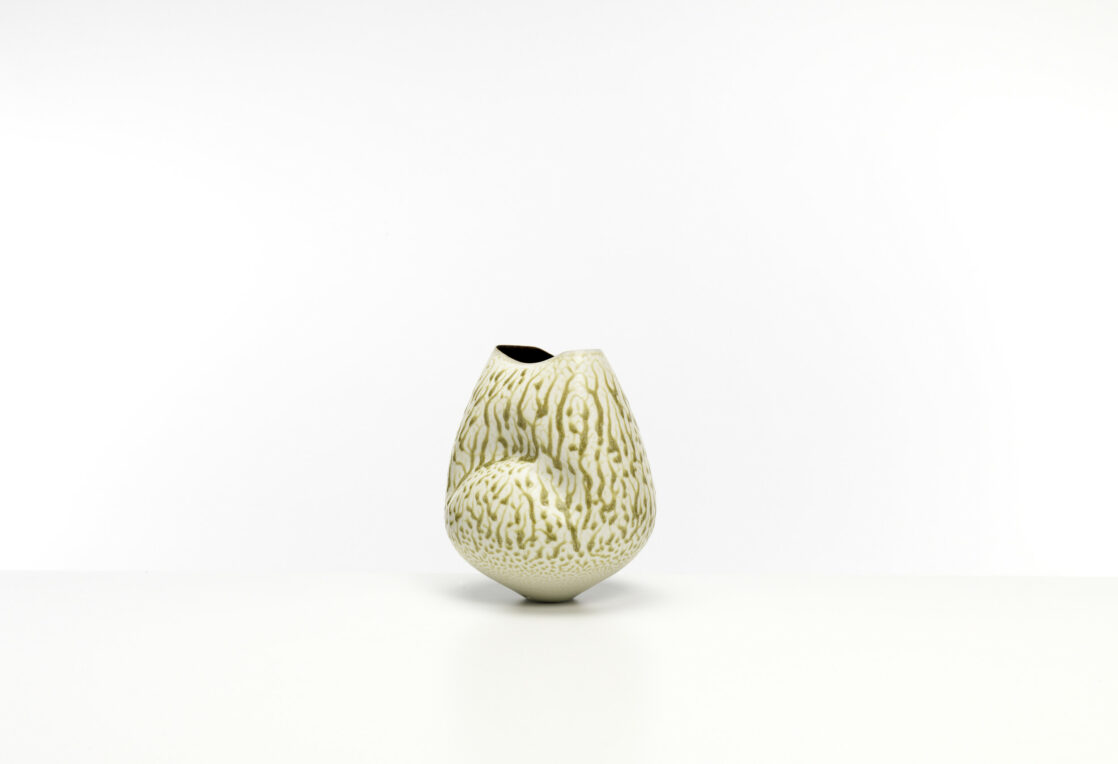
'Camber Vessel', 2021